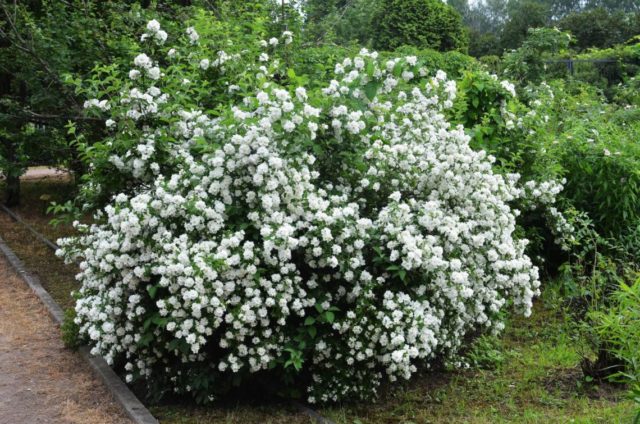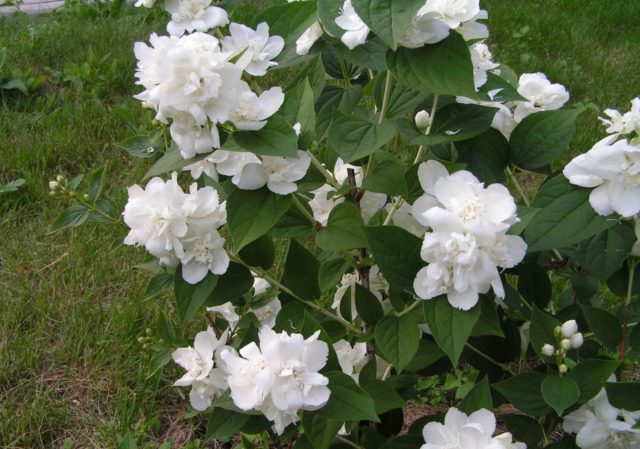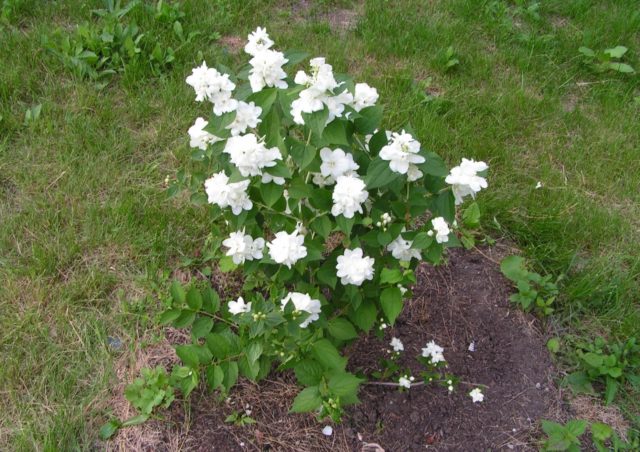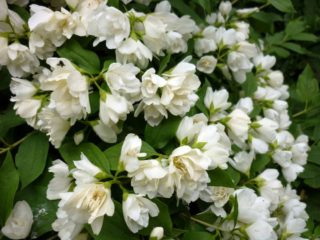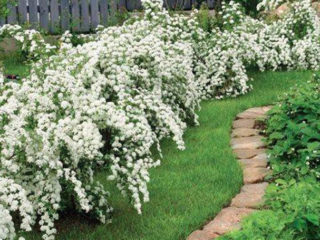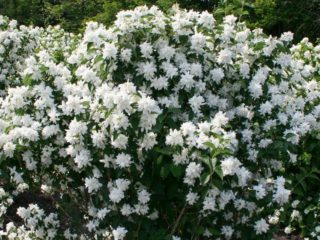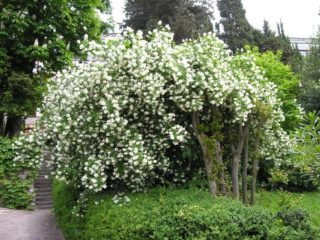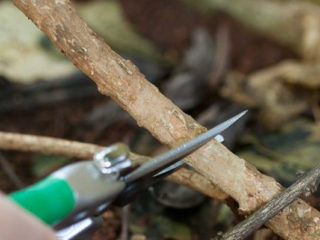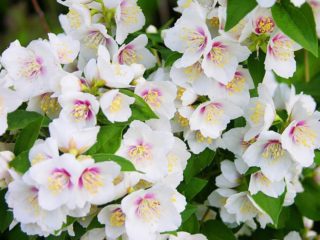Content
Photos and descriptions of mock orange Zoya Kosmodemyanskaya will enchant and delight every gardener. The shrub is unpretentious and beautiful. In landscape design, it is used alone, and also grouped with other plants, including for the design of hedges.
Description of mock orange Zoya Kosmodemyanskaya
Gardeners usually call the crown mock orange (Philadelphus coronarius) garden jasmine. Because of this, confusion arises with the classification of species. The shrub began to be called “mock orange” because mouthpieces (or chibouks) were made from its stems, and jasmine because the flowers were similar to a well-known crop. In fact, these are two different types of plants that belong to different families: mock orange, which is a real shrub, belongs to the Hydrangeaceae, and jasmine, like an evergreen vine, belongs to the Olives. However, both names are firmly rooted among the people.
Initially, the shrub appeared among ornamental plants in the gardens of Western Europe.
The very first heat-loving hybrids of Venechny mock orange were bred by breeder V. Lemoine in the 20th century. in France. Most of the varieties of this plant that can grow in Russia were created by N.K. Vekhov in the 40s and 50s of the 20th century, in particular, the variety Zoya Kosmodemyanskaya (Philadelphus coronarius Zoya Kosmodemyanskaya).
Chubushnik Zoya Kosmodemyanskaya is a tall, long-lived shrub. With proper care, it can please the eye for as long as 80 years, but this is no longer a rarity. The average lifespan of a crop is 30 years.
The characteristics of the jasmine variety Zoya Kosmodemyanskaya can be assessed from the description of the photo.
This deciduous ornamental bush reaches 3 m in height. Numerous straight shoots of the Zoya Kosmodemyanskaya mock orange with grayish bark form a spherical crown. The petiolate leaves are oval in shape with a sparsely toothed edge and arranged oppositely.
The snow-white semi-double flowers of the plant are quite large, collected in racemose inflorescences of 6-7 pieces, and emit a delicate, pleasant aroma. The fruit of the plant is a capsule with seeds.
An important feature of the bush is the bareness at the bottom. It is compact, with a small number of flowers, reminiscent of a neat round bouquet. Suitable for independent (single) or group planting, as well as creating hedges.
How the hybrid mock orange blossoms Zoya Kosmodemyanskaya
The Zoya Kosmodemyanskaya variety has very beautiful double flowers - white, with a slightly greenish tint that appears during their blooming. Their aroma is unobtrusive and pleasant. There are thin petals in the middle of the flowers, making them look airy.The inflorescences of mock orange Zoya Kosmodemyanskaya are quite large - 6 - 7 cm in length, of 7 - 9 flowers, 4 - 5 cm in diameter.
The shrub blooms on average for 22 days between early or mid-June and early July. This variety has a medium flowering period.
The plant needs to be pruned annually. Only strong shoots from last year bloom profusely. On the remaining branches the buds are small and there are few of them.
Double jasmine flowers Zoya Kosmodemyanskaya can be clearly seen in the photo:
Main characteristics
Chubushnik crown Zoya Kosmodemyanskaya tolerates frost well. In very cold winters the shoots may freeze, but they recover easily.
The shrub is also quite resistant to various types of diseases and pests.
Features of reproduction
This mock orange variety is propagated in several ways:
- By layering;
- Cuttings;
- Dividing the bush.
The first two methods are considered the most effective.
When propagated by layering, large stems are bent to the ground, secured and sprinkled with soil, and then watered. Once they have their roots in the spring, the cuttings can be separated.
Cuttings of mock orange Zoya Kosmodemyanskaya are carried out during or immediately after flowering, when there are young shoots. They are broken off with the “heel” and placed in water for a couple of weeks. The resulting cuttings are covered with a bag, a cut plastic bottle or jar and rooted. In August or early September, the seedlings are transplanted to a permanent place. In winter, young shoots need to be covered.
Mock orange is also propagated by dividing the bush - it tolerates a change of place well - but this is not a very convenient method, since the plant is quite large, in addition, its crown may suffer.It is even possible that the bush will not bloom for a year.
Planting and care
Chubushnik, or jasmine, Zoya Kosmodemyanskaya is a fairly unpretentious shrub that does not require certain conditions to be met. However, it will produce more flowers and maintain vibrant green foliage if given proper care. In addition, the plant will live longer and will be able to please a whole generation with its beauty and delicate aroma.
Recommended timing
The optimal time for planting mock orange Zoya Kosmodemyanskaya is considered to be autumn, from September 10 to October 10. Spring is also coming, the main thing is to catch it before the leaves bloom.
Site selection and soil preparation
When choosing a landing site, it is recommended to consider the following conditions:
- Mock orange loves the sun, but also tolerates light shade. Although experienced gardeners believe that even in partial shade the stems become very elongated and the flowering of the crop decreases.
- Prefers fertile soils and does not accept soil salinity.Advice! The shrub will grow well if you mix leaf soil, humus and sand in a ratio of 3:2:1.
- The culture does not tolerate excess and stagnation of moisture, as well as proximity to groundwater.
Landing algorithm
There are certain steps, the observance of which facilitates the process of planting mock orange (jasmine) Zoya Kosmodemyanskaya:
- The depth and width of the planting hole are usually 50 - 60 cm.
- The bottom is covered with a 15 cm layer of drainage made of crushed stone and sand.
- The roots with a lump of earth are carefully spread over the hole. The root collar should not be deepened by more than 2.5 cm to avoid rotting.
- To create favorable conditions, the planting hole is filled with fertile soil, rotted compost, ash and superphosphate are added.
- The soil is lightly compacted and watered abundantly.
Growing rules
Chubushnik crown Zoya Kosmodemyanskaya does not require adherence to strict rules, but it is still advisable to water, feed and prune the bush in a timely manner, as well as loosen the soil around it. A characteristic feature of garden jasmine is that it loves water very much.
Watering schedule
Mock orange requires a large amount of moisture for abundant flowering and comfortable existence. During drought, the leaves lose turgor, but after rains and regular watering it will be restored again. Normally, for one watering, especially in June and July, an adult garden jasmine plant needs 20 - 30 liters of water. During planting, 1 - 2 buckets are used per bush.
Weeding, loosening, mulching
In summer, mock orange Zoya Kosmodemyanskaya needs to be loosened 2 or 3 times to a depth of 4 - 8 cm. At the same time, weeds are removed. To prevent the roots of the plant from overheating and the moisture does not evaporate longer, the root circle is mulched with peat or soil in a layer of 3-4 cm.
Feeding schedule
It is recommended to fertilize mock orange (garden jasmine) 2 - 3 times a season. This will help the plant bloom profusely. At the beginning of spring, the plant must be fed with minerals containing potassium and phosphorus. Every year you need to add 1 bucket of mullein (or slurry) to the bush or use special complex preparations.
After the garden jasmine has faded, it would not be a bad idea to add wood ash (100 - 150 g) at the very base of the plant. In addition, you can feed the mock orange Zoya Kosmodemyanskaya with urea (15 g), superphosphate (20 - 30 g) or potassium sulfate (15 g). They are diluted in 10 liters of water, which is enough for 1 - 2 bushes. This is usually how 3-year-old mock orange is fertilized.
Trimming
The shrub needs formative and sanitary pruning 1 or 2 times a season - in autumn and early spring, before buds open. Branches that are too long can be shortened by trimming the tops. It is recommended to remove the lower shoots that shade garden jasmine, as well as old stems, leaving only those that are no more than 4-5 years old. Within a year, you can get the correct spherical shape and give the plant a well-groomed appearance.
In addition, annually after flowering the shrub is pruned, removing inward and damaged shoots, as well as dried inflorescences.
In the spring, 3 - 4 trunks of already middle-aged mock orange are shortened to 30 - 40 cm, and the rest are cut down at the base. Next year the bush will be transformed.
After rejuvenation, garden jasmine needs to be hilled up, fertilized, and in dry summers, watered and then mulched with compost.
Preparing for winter
Preparation of mock orange Zoya Kosmodemyanskaya for winter begins in September: they prune, fertilize the soil, and cover the root circle with a thick layer of sawdust.
An adult plant does not need to be covered. After spring pruning, it will quickly restore the crown and bloom. Even if there are no buds visible on the branches in spring, young shoots will be able to grow: to do this, you need to cut the bush at the base.
Pests and diseases
Chubushnik Zoya Kosmodemyanskaya is a plant resistant to diseases and pests. However, if you do not remove fallen leaves or do not trim damaged shoots in a timely manner, the crop will become more vulnerable. In order to prevent diseases and the appearance of pests, it is recommended to spray the bush with special preparations in the spring or autumn, after flowering.
Conclusion
Zoya Kosmodemyanskaya’s photo and description of mock orange will help you learn more about the appearance and characteristics of garden jasmine. The hybrid variety of this ornamental plant is very beautiful and exudes a delicate, pleasant aroma.
Reviews of mock orange Zoya Kosmodemyanskaya
